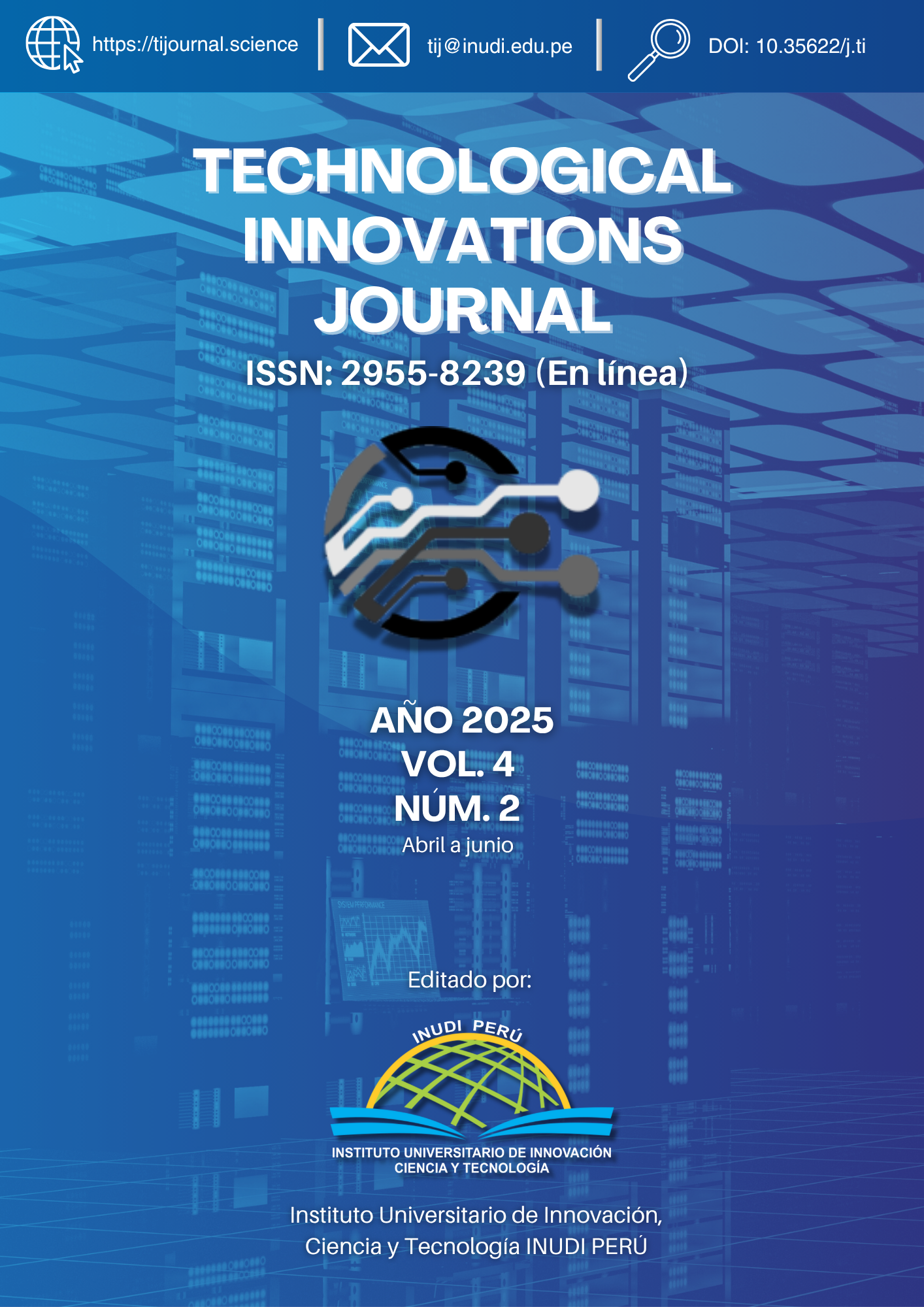Knowledge in AI, performance, and self-efficacy in secondary and higher education teachers
DOI:
https://doi.org/10.35622/j.ti.2025.02.001Keywords:
digital competence, professional development, pedagogical innovation, artificial intelligenceAbstract
The accelerated advancement of Artificial Intelligence (AI) has generated new challenges in the educational field, particularly regarding teacher preparedness to integrate these technologies into their pedagogical practice. The objective of this study was to evaluate the influence of AI knowledge levels on the professional performance and self-efficacy of secondary and higher education teachers. A quantitative approach was adopted, employing a non-experimental, cross-sectional, and correlational design. The sample consisted of 108 teachers in the Dominican Republic, selected through non-probabilistic sampling. A structured questionnaire was applied, which included sociodemographic variables, AI knowledge levels, and Likert-type scales to measure their impact on performance and teaching self-efficacy. The results indicated that 51% of participants had a basic knowledge of AI, while only 11% reached an advanced level. Nevertheless, 53.7% stated that the use of AI consistently improves their performance, and 47.2% considered that AI training significantly enhanced their self-efficacy. Chi-square tests revealed statistically significant relationships between AI knowledge and performance (p = 0.018), as well as teaching self-efficacy (p = 0.0007). In conclusion, the findings highlight the need to implement continuous and differentiated training programs that strengthen teachers’ technological competencies, foster their confidence in educational practice, and contribute to bridging the digital divide. Furthermore, it is suggested to design sustainable educational policies that enhance the positive impact of AI on teaching.
References
Achic-Huaman Villarruel, M. T., & Hinostroza, M. E. (2024). Competencia digital y autoeficacia para el uso de TIC en docentes de instituciones educativas públicas de nivel secundario de Huancayo [Tesis de licenciatura, Universidad Nacional del Centro del Perú]. Repositorio Institucional de la Universidad Nacional del Centro del Perú. https://repositorio.uncp.edu.pe/handle/20.500.12894/11978
Bartolomé, A., Pérez, A., & Prendes-Espinosa, M. P. (2024). Informe EDUTEC sobre Inteligencia Artificial y Educación. EDUTEC https://edutec.es/wp-content/uploads/2024/11/Edutec-INFORME-IA-MAQUETADO-FINALv2.pdf
Carranza Alcántar, MDR.; Macías González, GG.; Gómez Rodríguez, H.; Jiménez Padilla, AA.; Jacobo Montes, FM. (2024). Percepciones docentes sobre la integración de aplicaciones de IA generativa en el proceso de enseñanza universitario. REDU. Revista de Docencia Universitaria, 22(2), 158-176. https://doi.org/10.4995/redu.2024.22027 DOI: https://doi.org/10.4995/redu.2024.22027
Coque Aimacaña, A. G., & Guarochico Alomoto, C. N. (2024). La inteligencia artificial en las competencias digitales del docente [Trabajo de licenciatura, Universidad Técnica de Cotopaxi]. Repositorio de la Universidad Técnica de Cotopaxi. https://repositorio.utc.edu.ec/handle/123456789/12329
Creswell, J. W., & Creswell, J. D. (2021). Research Design: Qualitative, Quantitative, and Mixed Methods Approaches (5.a ed.). SAGE Publications.
Hernández-Sampieri, R., Fernández-Collado, C., & Baptista-Lucio, P. (2014). Metodología de la investigación (6.ª ed.). McGraw-Hill.
Isusqui, J. C., Salazar, I. E., Vilchez, C., Cortez, H. O., García, B. L., & Amaya, K. L. (2023). La Inteligencia Artificial al servicio de la gestión y la implementación en la educación. Mar Caribe Editorial. https://doi.org/10.31219/osf.io/z2y7c DOI: https://doi.org/10.31219/osf.io/z2y7c
Kerlinger, F. N., & Lee, H. B. (2002). Investigación del comportamiento: Métodos de investigación en ciencias sociales (4.ª ed.). McGraw-Hill.
Martínez-Rivera, O. (2024). El impacto de la Inteligencia Artificial (IA) en el proceso de enseñanza-aprendizaje de los trabajos en la universidad. European Public & Social Innovation Review, 9, 1–17. https://epsir.net/index.php/epsir/article/download/885/572/5879 DOI: https://doi.org/10.31637/epsir-2024-885
Ortega Azurduy, M. A., Machaca Mamani, J. J., & Daza Morales, J. J. (2023). El efecto de la inteligencia artificial en el rendimiento académico de estudiantes universitarios: Un análisis desde la autoeficacia y la ética. Revista Científica de Investigación, 9(3), 13–25. http://www.scielo.org.bo/scielo.php?script=sci_arttext&pid=S2518-82832023000300013
Pérez Pérez, O. J., & González de Pirela, N. J. (2024). Formación Docente para el Uso de la Inteligencia Artificial. Ciencia Latina Revista Científica Multidisciplinar, 8(5), 11772-11788. https://doi.org/10.37811/cl_rcm.v8i5.14594 DOI: https://doi.org/10.37811/cl_rcm.v8i5.14594
Pineda Sánchez, V. Y. (2025). La inteligencia artificial como herramienta de optimización en la docencia pública: retos y oportunidades para el futuro de la educación. RIESED - Revista Internacional De Estudios Sobre Sistemas Educativos, 3(16), 803-822. https://doi.org/10.5281/zenodo.15697704
Quezada Tumalli, K. A., Saquisilli Bajaña, I. M., Kanki Peñafiel, M. A., & Macías Baldeon, D. P. (2025). La inteligencia artificial y la producción científica en el campo de la educación. Una revisión sistemática. RECIMUNDO, 9(2), 141–159. https://doi.org/10.26820/recimundo/9.(2).abril.2025.141-159 DOI: https://doi.org/10.26820/recimundo/9.(2).abril.2025.141-159
Rondon-Morel, R., Pacotaipe-Delacruz, R., Alarcón-Nuñez, E. & Yepez-Salvatierra, P. (2024). El Impacto de la Inteligencia Artificial en la Formación Docente. Revista Tecnológica-Educativa Docentes 2.0, 17(2), 368-375. https://doi.org/10.37843/rted.v17i2.566 DOI: https://doi.org/10.37843/rted.v17i2.566
Troya Santillán, C. M., Bernal Párraga, A. P., Guaman Santillan, R. Y., Guzmán Quiña, M. de los A., & Castillo Alvare, M. A. (2024). Formación Docente en el Uso de Herramientas Tecnológicas para el Apoyo a las Necesidades Educativas Especiales en el Aula. Ciencia Latina Revista Científica Multidisciplinar, 8(3), 3768-3797. https://doi.org/10.37811/cl_rcm.v8i3.11588 DOI: https://doi.org/10.37811/cl_rcm.v8i3.11588
Universidad del País Vasco & Universidad de Pau. (2024). La inteligencia artificial acierta en un 70% al corregir trabajos escolares de Primaria. Radio Bilbao. https://cadenaser.com/euskadi/2024/10/15/la-inteligencia-artificial-acierta-en-un-70-al-corregir-trabajos-escolares-de-primaria-radio-bilbao/
Downloads
Published
Issue
Section
License
Copyright (c) 2025 Beatriz Lafontaine, Wanda Marina Román-Santana (Autor/a)

This work is licensed under a Creative Commons Attribution 4.0 International License.











